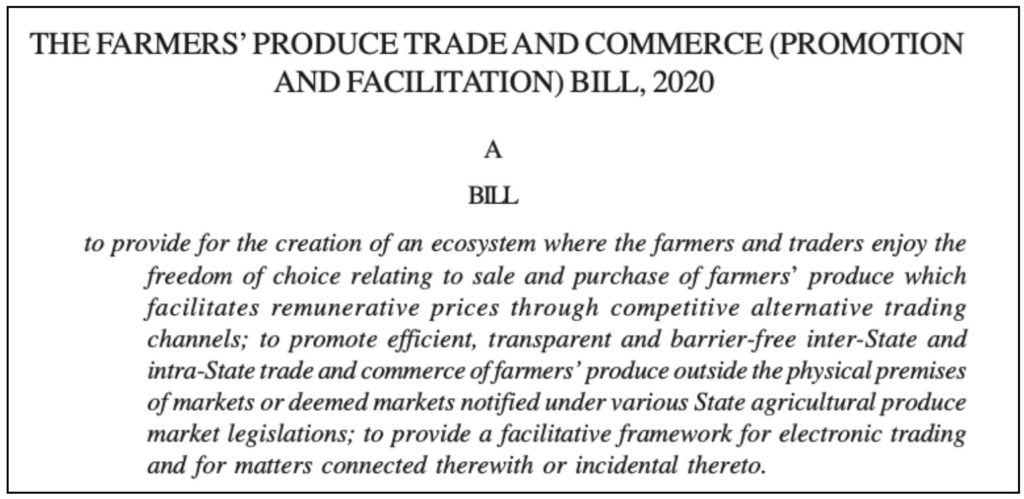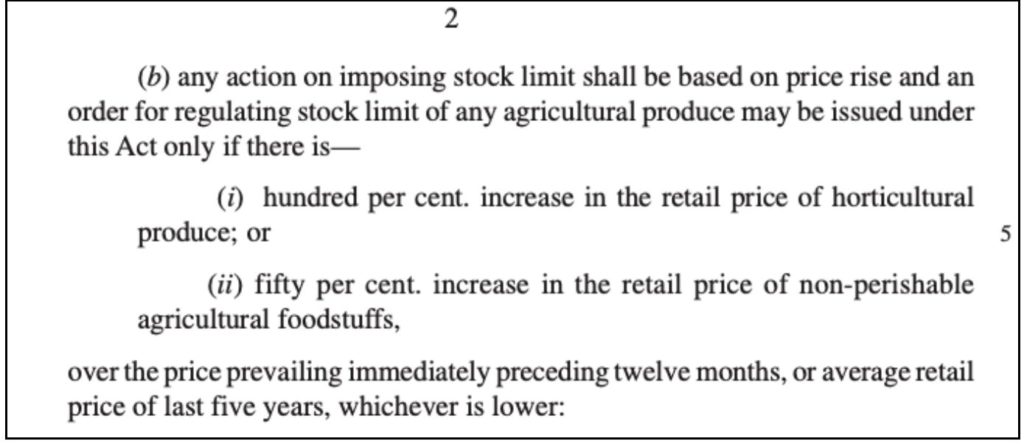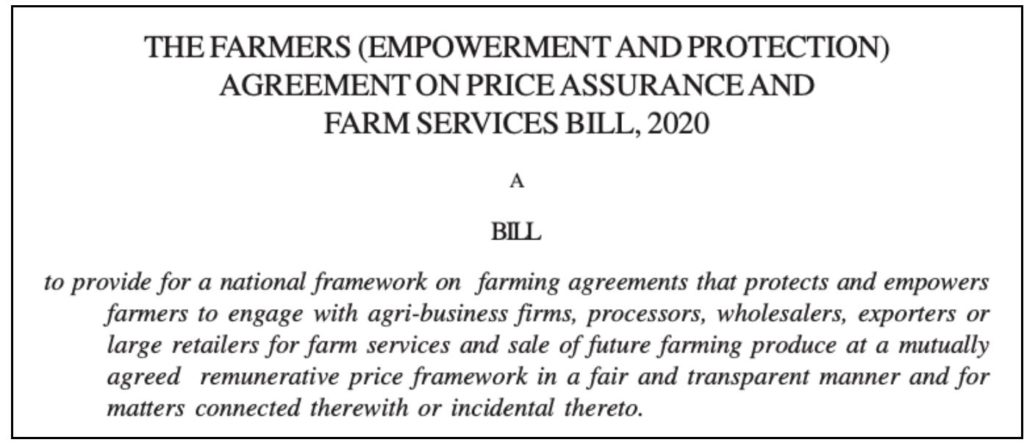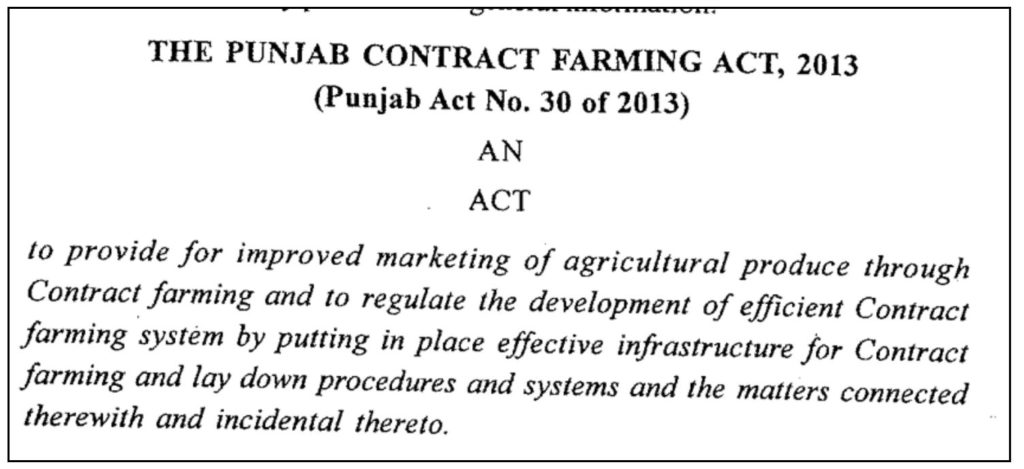Though the current BJP government has passed 3 laws to make changes to Agricultural Marketing, this is not the first attempt at reform. Multiple attempts have been made earlier to reform agricultural marketing. Here is a brief history.
A Nation-wide strike has been called today (08 December 2020) by the farmers who are protesting against the farm bills which were introduced recently by the Central Government. Various political parties have extended support to this call.
Since the three Farm bills were passed in the parliament in September 2020 and later received the assent of the President, the opinion among the farming community and the experts is divided. While few consider it to be a landmark legislation that would greatly benefit the farmers, there are others who feel that these bills would do more harm than good to the farmers.
The current protest near Delhi, mostly comprising of farmers from Punjab and Haryana, also has farmers from other states joining in. Among the various concerns being raised by them, the main apprehensions seem to be around Minimum Support Price (MSP) and the provision for contract farming.
However, there are many other key provisions that form part of these farm bills. In this story we take a look at these three farm bills, historical context and the position of political parties over the years regarding the agriculture reforms.
The three bills focus on reducing the barriers in Agricultural Marketing
While the bills passed recently in the parliament are being colloquially referred to as Farm bills, the bills are unique and are three sperate bills covering different aspects relating to agriculture especially ‘Agricultural Marketing’.
- Farmers Produce Trade and Commerce (Promotion and Facilitation) Act, 2020
- Essential Commodities (Amendment) Act, 2020
- Farmers (Empowerment and Protection) Agreement on Price Assurance and Farm Services Act, 2020.
Here is a brief look at the provisions of each of these acts.
Farmers Produce Trade and Commerce (Promotion and Facilitation) Act, 2020
The stated purpose of this act is to create an ecosystem where the farmers and the traders have the flexibility of choice with the availability of various alternatives. The act also aims to promote efficient, transparent and barrier free inter-state and intra-state trading beyond the APMCs (Agricultural Produce Market Committee)

The act limits the control of APMCs to the APMC market yard and the other trading parties are free to transact the agricultural produce beyond the limits of market yards which are now being referred to as ‘trade area’. As the preamble of the act indicates, there is also scope of creating electronic trading platforms.
While creating the environment beyond the APMCs is directed at seamless trade across the country, it is also seen as limiting the State government’s control since APMCs are under their control.
Essential Commodities (Amendment) Act, 2020
The second act is an amendment to the existing Essential Commodities Act- 1955. The act aims to remove the unpredictability in notifying stocking limits by linking to rule-based price triggers.
The restrictions on the stocking of Essential commodities would be deployed only under exceptional circumstances.

As per the amendment, the stocking limits can only be invoked in case there is a 100 % increase in the retail price of horticultural produce or 50% increase in retail price of non-perishable food stuffs.

While this act has so far escaped the scrutiny and criticism compared to the other acts, it does play a key role in the overall context. The removal of stocking limits is seen by some as aiding the larger players who can now stock the agricultural produce in larger quantities, which was not the case prior to the amendment.
Farmers (Empowerment and Protection) Agreement in Price Assurance and Farm Services Act, 2020
This act provides for written agreements between the farmers and other parties (agri-business firms, processors, wholesalers, individual traders, individuals etc.)

This act provides a framework for contract farming with minimal obligations compared to an earlier proposed Model Contract Farming Act in 2018. It expands the scope of what are considered as farm services. Prior to this national level legislation regarding contract farming, framing of any law related to this subject was left to the state governments. Only a few states have created dedicated laws pertaining to contract farming.
The government maintains that these Acts are part of the continuous reform process
Reforms in agriculture especially relating to the sale & purchase of agricultural produce have been long sought and there have been multiple attempts over the years to bring in legislation in this regard.
The Minimum Support Price (MSP) and the procurement of the agricultural produce by Food Corporation of India (FCI) has been one such efforts to ensure that the farmers are not exploited, and they get a right price for their produce.
However, the limited extent of FCI procurement and the logistical challenges in procurement and disbursement of the agricultural produce meant that majority of the farmers and their produce was left out of MSP regime.
The idea of APMCs run by the State government was also aimed at ensuring that the farmers are not exploited by the traders and they get a right price for their produce beyond providing access to markets within the local area of the farmers.
Since the opening up of the economy in early 1990s, there have been attempts to reform the existing laws including the APMC acts, since they are seen to compromise the farmers interest and tend to favour trader-middlemen. The entry of private players in agriculture processing industry has also increased the demand to allow them at the point of source.
As part of National Agricultural Policy in the year 2000, it is stated that private sector participation will be promoted through contract farming and land leasing arrangements would be allowed to ensure assured market for produce, capital inflow etc.

This was part of the ‘Rainbow Revolution’ proposed by the then NDA government. It is therefore evident that allowing contract framing and private investments has been part of the national discourse for agriculture for at least two decades.
However, one of the major challenges in bringing in reforms is that the agricultural marketing reforms fall under the purview of the states and historically there have been challenges in bringing in uniformity in the State laws. The earlier efforts of the Central Government have been towards making recommendations and pursuing with the states to make the necessary changes to state-level laws.
The Agricultural Produce and Livestock Marketing (Promotion and Facilitation) Act, 2017 was one of the attempts towards this, where-in the states were urged to reform APMCs in line with the recommendations provided in this act.
In a Department of Economic Affairs’ Expert Committee Report of 2018, recommendations were made for marketing reforms in Agriculture. The Electronic National Agricultural Market (e-NAM) has been one of the attempts to bring in integration of markets across the states.
Changing stands of various stakeholders
The support and opposition to the current farm bills by the various political parties have not been consistent with their stand over the years. As highlighted above, the initial vision of bringing in agricultural marketing reforms by introducing contract framing and allowing private sector was proposed by NDA-1 government as part of the National Agriculture Policy in 2000. The current NDA government pushed through the Farm bills in the parliament of which the limiting the role of APMCs, introducing contract farming etc. are a key part.
The UPA government which was in power between the two NDA governments , has also made attempts to push through reforms in APMCs. In 2012, the then Prime Minister Manmohan Singh has asked the states to review and amend Agriculture Produce Marketing Act. There are also reports that Sharad Pawar, the then Agriculture Minister in UPA government has tried to push through amendments in APMC Act and provision for including private sector. However, the NCP has since issued a clarification saying Pawar had only asked states to explore the earlier model act.
While the current BJP government has questioned the opposition’s stand against the farm bills arguing that they pushed for such changes when they were in power, there have been occasions of double speak from within the BJP. Madhya Pradesh CM Shivraj Singh Chouhan has reportedly said a few days ago that the state has decided to buy crops that are harvested MP only and if someone from outside the state tries to sell, they will arrested. BJP has earlier opposed suggestions on the removal of APMCs or Arhtiyas when they were in opposition.
While a major part of the current opposition is from the State of Punjab (with both the government and the opposition in the state supporting the protests) , the state does have a history of trying to implement a Contract Framing Act in 2013.

It does appear that the governments over the years (led by different parties) have made attempts to bring in reforms in Agricultural marketing. Their stand against the acts and earlier reforms, as expressed and clarified by the political parties seem to be based on their interpretations and definitions of the laws.
In this context, an open dialogue with the relevant stakeholders like farmers and state governments hearing voices of those opposing these changes appears to be need of the hour.
Featured Image: New Farm Bills


